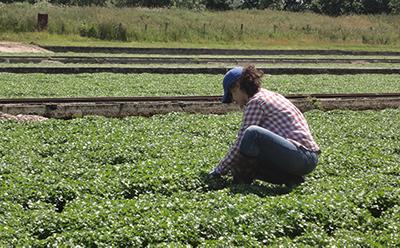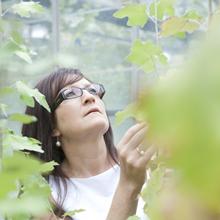Securing food for the future
Safeguarding food sources for future generations
To keep pace with the growing global population, the United Nations (UN) estimates that by 2030 we will need 50 per cent more food, 50 per cent more energy and 30 per cent more water.
“This issue is what we refer to as a ‘perfect storm’ – the concept that energy, water and food, all acting together, will be very insecure in a very short period of time,” explains Guy Poppy, Professor of Ecology and Chief Scientific Adviser to the Food Standards Agency. “The University of Southampton is an ideal place to tackle this because we have a real strength in interdisciplinarity – bringing researchers from a wide range of fields together to address this global challenge.”

Enhancing production
Gail Taylor, Professor of Plant and Environmental Biology, is conducting research focused on developing varieties of watercress with enhanced productivity.
Providing new insights into its potential, Gail’s groundbreaking research hopes to use selective breeding to improve nutrient-dense watercress so it can be grown in developing countries.
Gail explains: “We have sequenced the DNA of about 200 lines of watercress, which we’ve crossed and made a new family of watercress, so we can identify molecular markers that are linked to characteristics we’d like to improve.”
Food security is a very pressing issue; globally, around a billion people are already food insecure.
Health benefits
According to the UN Food and Agriculture Organization, around 40 per cent of children aged under five in developing countries are anaemic, so high-iron watercress could have a significant impact on health. Other potential benefits include the natural release of a chemical called phenethyl isothiocyanate (PEITC), which is known to be effective in preventing blood supply to cancer cells.
Gail is now working with a number of commercial partners including Sainsbury’s and Vitacress Salads so the benefits of the crop can be made widely available across both developed and developing nations.
Commercial potential
One variety of watercress developed through Gail’s research is Boldrewood, a dwarf watercress that delivers anti-cancer chemicals. Working alongside the SETsquared partnership, ranked the top university business incubator in the world, Gail aims to take this new variety to market.
“Southampton is a very innovative university – one of the best universities for commercialisation and innovation,” Gail says. “It’s a good environment to be doing this type of applied research, which moves into innovation pretty quickly.”
Providing future security
Approaching food security from a different angle, Guy is leading a multi-million pound programme in Malawi, Colombia and Peru, looking at how we can make sure people living between forests and agriculture are healthy in terms of nutrition.
Guy explains: "This project is looking at the different types of benefits people get from the environment that enable them to feed themselves, and how, by feeding themselves they in turn affect the environment.”
Entitled Attaining Sustainable Services from Ecosystems through Trade-off Scenarios (ASSETS), the project brings together partners from around the world as they work to understand how people in vulnerable parts of the world can keep themselves food secure.
“Food security is a very pressing issue; globally, around a billion people are already food insecure, around a billion more are obese, and another billion are malnourished, not in terms of lack of calories, but not having a diet that provides a healthy lifestyle. This is a challenge that we are working hard to address at Southampton,” says Guy.
More information on Guy's research
More information on Gail's research
You may also be interested in:

Improving lives worldwide
Supporting the UN Sustainable Development Goals to improve lives around the globe.

Reaching 10 billion: opportunity or concern?
Understanding the facts about population change.

Putting vulnerable people on the map
How cutting-edge spatial data is giving people their basic human rights

